Maisonneuve
Jean-Martin Gagnon
2023
| 6 x 25 min
Documentary series
Original French version, English subtitles
Awards and Festivals
Winner Laurier francophone du Nord Les Lauriers de l’audiovisuel 2024
Winner series Coup de coeur Fonds Bell Festival du cinéma international en Abitibi-Témiscamingue 2023
Official SelectionLes Rendez-vous Québec Cinéma (2024)
A coproduction of the National Film Board of Canada, Coop Vidéo de Montréal, Akka Films, Temps Noir, in collaboration with TV5 MONDE
2015. Eleven students at Montreal’s Collège de Maisonneuve are arrested as they prepare to leave for Syria, where they plan to become Islamic State fighters. The student body—more than 50 percent of which is composed of Muslims of Arab descent—is deeply shocked. Over six episodes, Maisonneuve looks at the repercussions of this event and the questions it continues to raise, introducing us to five young adults who are trying to find their way in an environment where mistrust of the “other” is the norm.
Filmed over several years, Maisonneuve drops us into the culturally pluralistic college as it picks up the pieces after the trauma of 2015. The protagonists’ early opinions become more nuanced, revealing a maturity that reflects their journeys. We witness as their thinking evolves and becomes marked by a real openness to others.
The series takes us into the heart of the dialogue between different factions, as the college creates a safe space for the exchange of ideas in order to foster debate and reduce tensions among students. With its humanistic approach, Maisonneuve highlights both the importance and the fragility of living together in harmony in Quebec.
WATCH THE SERIES
2015. Eleven students at Montreal’s Collège de Maisonneuve are arrested as they prepare to leave for Syria, where they plan to become Islamic State fighters. The shocking development affects everyone and exacerbates tensions already present at the school, where more than half the students are Muslims of Arab descent. Maisonneuve looks into the repercussions of this significant event and at the important questions it continues to raise. We meet Kaëlla, Rayene, Idir, Stéphanie and Samuel, young adults trying to find their way in a highly strained environment, where mistrust of the “other” is the norm. “We kind of became the lab rats of radicalization,” Rayene says.
Filmed over several years, this six-episode series takes us into the culturally pluralistic Collège de Maisonneuve, as the school picks up the pieces after the trauma of 2015. The series offers unprecedented access to the daily lives of students with different backgrounds and opinions. Each of the protagonists offers smart and nuanced views on their lives in their late teens, revealing a maturity that reflects their own journeys. We see how their thinking evolves, and how their reflections become marked by a real openness to others.
Maisonneuve looks at the dialogue that begins among the various groups. “Giving young people permission to say what they think, to say they don’t agree, is a good thing in a modern society that wants to grow and that considers itself open and democratic,” says Momo, a school social worker . By allowing them to express themselves and creating safe spaces for dialogue, the College fosters debate in order to deconstruct persistent myths and reduce tensions among members of the student body. With its humanistic approach, Maisonneuve highlights both the importance and the fragility of living together in harmony in Quebec.
ONE AND TWO LINERS
One liner
Maisonneuve highlights the importance—and the fragility—of living together in harmony in Quebec, examining the fallout of a shocking event that shook Collège de Maisonneuve.
Two liner
Over six episodes, Maisonneuve looks at the repercussions flowing from the arrest of 11 students at Montreal’s Collège de Maisonneuve as they prepared to join the ranks of the Islamic State in Syria. From the initial shock to a gradual opening for dialogue, the series follows the paths of six exceptional young people who share their points of view. Through their eyes, Maisonneuve highlights both the importance and the fragility of living together in harmony in Quebec.
EPISODES DESCRIPTIONS
EPISODE 1 Collateral Damage
Collège de Maisonneuve is shaken by a shocking turn of events. Both students and faculty are deeply affected and try to make sense of this disturbing development.
EPISODE 2 Systemic Problems
The student association engages in critical self-assessment over diversity and considers the best way forward. Meanwhile, students question the association’s practices.
EPISODE 3 Intergenerational Conflicts
Different generations come together to discuss major issues, revealing wildly divergent points of view. How can we live together while respecting each other’s differences?
EPISODE 4 Collective Responsibilities
The 2017 Quebec mosque attack renews the debate over radicalization. In this tension-filled period, the Maisonneuve community finds itself grappling with questions of personal and social responsibility.
EPISODE 5 Rebuilding Relationships
Police Tech students meet with members of an Algonquin community. They learn about the realities of minority groups… and the consequences of not following the rules.
EPISODE 6 Daring to Risk Failure
Students take stock of their turbulent time at Maisonneuve. They reveal how the remarkable and striking events of the last two years—and the reflections they brought on—have influenced their own journeys.
INTERVIEW WITH DIRECTOR, JEAN-MARTIN GAGNON
What drove you to go back to the question of how we live together as a society, following the events of 2015?
It was interesting to see how the college reacted to the crisis. Instead of behaving like all of our fine major public institutions and responding with repression, it opted instead for a more democratic approach—one based on listening and sharing ideas—in order to understand what had happened.
This context of openness seemed to us to offer an opportunity to tell the story of contemporary Quebec, to look more broadly at the question of the multiplicity of individual identities in the province and what part they play in a collective identity. The college is at the heart of a society in the midst of a period of change and cultural turbulence. It represents a turning point in the lives of young people facing challenges, like social exclusion, which can leave them susceptible to radicalization—not only in terms of politics, but, more importantly, in terms of their identity.
Why was it important to you that we hear the voices of young people whose points of view are at times diametrically opposed to each other?
First of all, because we couldn’t avoid them. We hung around in the hallways with a film crew, without really knowing who would turn out to be our protagonists. It became clear who they would be through their desire to speak in the public spaces we were in. Of course we had to make choices, and the idea was to not have five similar characters. So the diversity of points of view went hand in hand with the diversity of our protagonists.
I find it interesting that this observation and this question seem to come up a lot, because, fundamentally, they often agreed with each other. I think that, like the people, the subjects in a sense made themselves unavoidable, too. Subjects on which there was consensus were cut in editing. Consensus is pretty boring, especially in a series that wants to get people talking about ideas, playing with nuance, and taking the time to think about matters that are complex and filled with shades of grey.
Your series highlights a divergence of opinions, but there’s also something all your protagonists have in common: openness. What does being open to the other mean in a context like this?
I believe that documentaries have no choice but to present ‘openness’ on the screen. First of all, the protagonists are revealing their private, intimate selves to us, to the camera, to the film crew, to the audience. It’s natural that, in that context, those who are featured in the series will have personalities that tend towards openness to the other.
Furthermore, openness was an essential part of the sequences at L’entr’actes, the spot at the school where young Arab Muslims would hang out, and where we filmed some of their conversations. The young people showed a lot of openness in welcoming a film crew made up 100 percent of white people—especially in the period after the events, when the media associated their school and their community with the Islamic State for no valid reason.
It wasn’t a foregone conclusion that we’d get the participation of the student association either, because they were very concerned about media attention. The students were often depicted as radical communists. We had to convince them of our good intentions, while explaining that we would also be following students at the college who were overtly opposed to them. It was complicated.
The students in police tech also showed a lot of openness in letting us follow them over four days, while they travelled to an Algonquin community where allegations of sexual abuse and abuses of power weighed on them.
You knew you were venturing into often delicate subject matter. How did you approach students so that they were comfortable and felt they could speak from the heart?
I liked them. And I still like them. Despite my own biases, my opinions, and my culture—which are in many ways profoundly different from theirs—there’s something I admire in each and every one of them, and I feel a lot of affection for them. I started by building relationships based on our common links—what united us. Later, we were able to get into subjects that were more contentious and complicated, subjects on which we often differed. That took a few interviews and filmed moments that nobody will ever see. For me, it’s the same as the normal process of developing a friendship; when you’ve created a connection of trust, you can discuss anything.
What message does your series have for educational institutions that find themselves dealing with a similar situation, in which the student body is deeply divided?
To be happy about it. To take advantage of those divisions and see them as an opportunity to foster discussions and create opportunities for positive encounters. To engage with participants who want to be a part of this
great process of reflection, and who, like the young people in the series, have maintained that passion and desire to change the world.
Do you believe openness and dialogue are really the first steps towards lowering tensions?
Yes, but I think we don’t have any choice but to first go through the ‘tensions.’ That’s the starting point that makes dialogue possible and ensures the openness is genuine. Simplistic openness can be facile and puerile. Like someone who says, ‘I don’t see skin colour. I don’t make any distinction.’ It’s absurd. You can’t come to openness in advance. Everyone has biases, opinions and prejudices, and you have to put them to the test before others. When we talk about dialogue, we’re also talking about confrontation and intensity. It’s not just a walk in the park.
College is the last real meeting place and place for dialogue in our society. People from all social classes are there. It’s the only place accessible to all, and the only place where this confrontation could have been managed.
Before you can call yourself ‘open,’ you have to genuinely live with others.
What do you hope audiences take away from the series?
That living together is not easy! Often, when conservative-leaning pundits rail against ‘woke’ culture, their critique consists of saying that students are wearing rose-coloured glasses, that they think everyone is nice and friendly, and that they’re overly empathetic. With this series, I hope people can understand that these ideas travel a long way before they wind up in our most popular media spaces. That they are debated and constantly questioned. That people experience them in their daily lives before they become values.
And what about you? What do you take away from your encounters with these five bright young people?
A great sense of confidence in this generation.
Trailer
Excerpts
Kaëlla Stapels and the association
Poster
Contact NFB publicist for high-resolution poster for print.
Images
Loading...
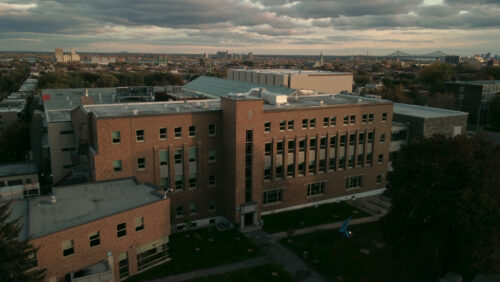
Download
Loading...
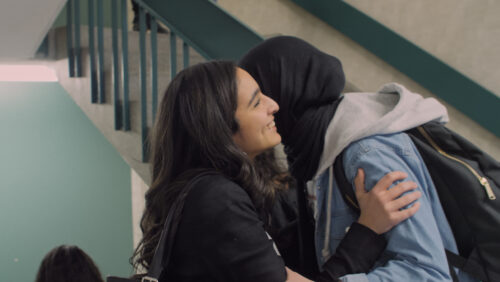
Download
Loading...
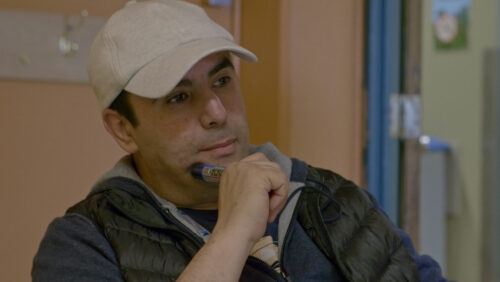
Download
Loading...
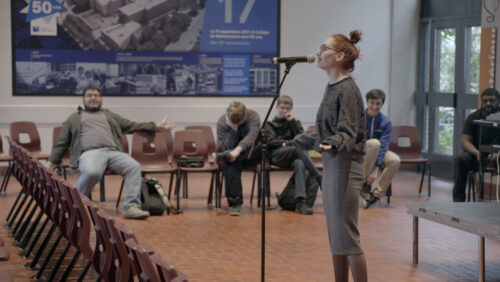
Download
Loading...
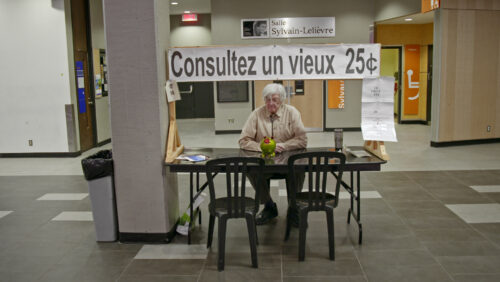
Download
Loading...
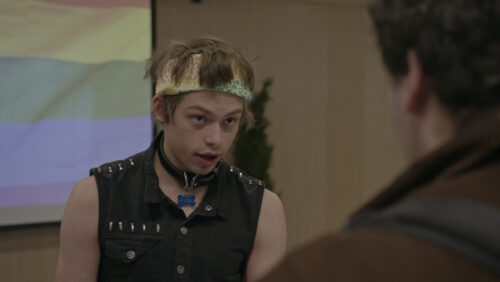
Download
Loading...
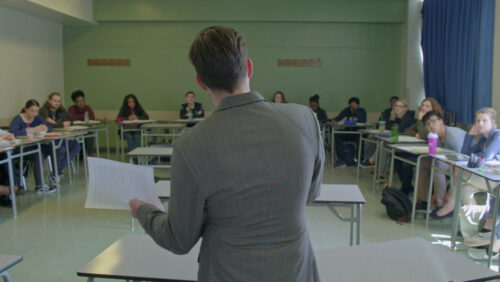
Download
Loading...
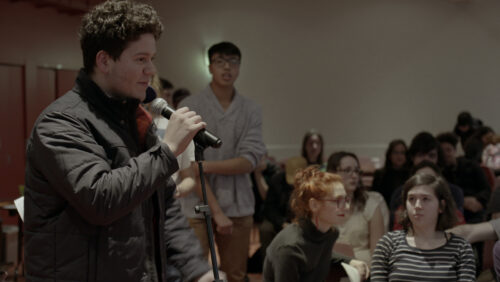
Download
Loading...
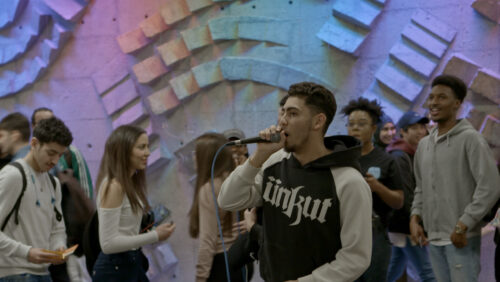
Download
Loading...
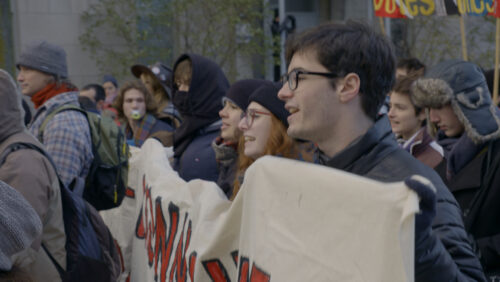
Download
Loading...
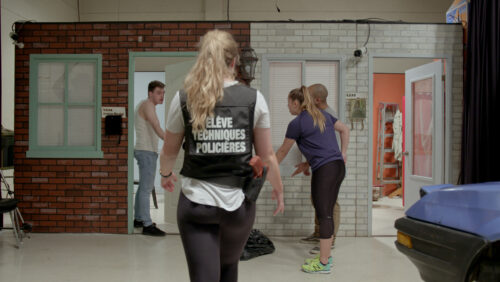
Download
Contact NFB publicist for high-resolution images and poster for print.
Team
Jean-Martin Gagnon
Director
Photo
Photo : Myriam Frenette
Nicolas Wadimoff
Co-Writer
Photo
Photo : Ufuk Emiroglu
Emmanuelle Walter
Co-Writer
Photo
Photo : Loris Guémart, Arrêt sur images
Nathalie Cloutier
Producer and Executive Producer, NFB
Photo
Photo : Valérie Sangin
Philippe Coeytaux
Producer (AKKA Films)
Photo
Photo : Karine Sudan
Hany Ouichou
Producer (Coop Vidéo)
Photo
Photo : Courtesy
Serge Gordey
Co-producer (Temps noir)
Photo
Photo : Courtesy
Martin Laurent
Co-producer (Temps noir)
Photo
Photo : Courtesy
Credits
A series directed by
Jean-Martin Gagnon
Written by
Nicolas Wadimoff
Emmanuelle Walter
Produced by
Nathalie Cloutier (NFB)
Hany Ouichou (Coop Vidéo)
Philippe Coeytaux (AKKA Films)
Serge Gordey and Martin Laurent (Temps noir)
Editing
Philippe Lefebvre
Andrea Henriquez (Episode 5)
Cinematograhy
Philémon Crête
Natan B. Foisy
Sound Design
Jacob Marcoux and Christophe Voyer
Music
Marc-Antoine Barbier
With the participation of
Rayene Bouzitoun
Mohamed Mimoun
Kaëlla Stapels
Idir Mazouzi
Erik Pirro
Jean-Félix Chénier
Stéphanie Cronier
Samuel Dufresne
Nancy Moreau
Director “Collège de Maisonneuve 2017–2018” segment
Nicolas Wadimoff
Research
Emmanuelle Walter
Collection Director
Nicolas Wadimoff
Editing
Philippe Lefebvre
Cinematography
Philémon Crête
Additional Cinematography
Natan B. Foisy
Sound Recording
François Forcier
Additional Sounz Recording
Marc-Antoine Barbier
Jean-François Caissy
Jacob Marcoux
Pascal Picher-Larose
Simon Plouffe
Olivier Rogers-Larouche
Additional Images – Drone
Danny Taillon
Editing Assistants
Timothée de Bouville
Ufuk Emiroglu
Technical Support – Editing (NFB)
Pierre Dupont
Marie-Josée Gourde
Patrick Trahan
Translation and Subtitling
Trans & Sub Coop
Titles and Infographics (NFB)
Mélanie Bouchard
Online Editing and Colourization (NFB)
Yannick Carrier
Foley
Simon Meilleur
Foley Recording (NFB)
Luc Léger
Geoffrey Mitchell
Sound Design
Jacob Marcoux
Christophe Voyer
Re-recording (NFB)
Isabelle Lussier
Music
Marc-Antoine Barbier
Archives
Assemblée nationale du Québec
Groupe TVA
Journal Le Soleil
Société Radio-Canada
Rights Clearance
Karine Perron
Special thanks to
Léonard and Odrée Laperrière
Suzie Tremblay and Pierre Gagnon
Marilou Caravecchia-Pelletier
Jimmy Bob and Davy Jones
Rosalie Chicoine Perreault
Alexandre Lefebvre
Thanks to
The students, faculty, staff and administration of Collège de Maisonneuve, Line Légaré, Guy Gibeau, Malika Habel, Anouk Roussy, Lina Raymond, Raymonde Bergeron, Pierre Lefebvre, Lysa Belaïcha, Rachel Binette, Sabrina Cyr-Vidal, Amani Djilani, Yasmine Ferrat, Nidia Guerrier, le groupe Iconz, Axelle Lefebvre, Lyne Saighi, Razine Boureghit, Abdellah Azzouz, Alexandra Vaillant, Coquelicot Ayotte, Céline Bisson, Amélie Faubert, Nathalie Foucher, Réjean Hamon, Marco Harvey, Anne-Marie Le Saux, Jeremy Ouellet, Ivan Perez, Julie Prince, Dany Rodier, Samuel Vilanove, Réjean Vanasse, Hervé Simoneau and all the members of Éducation 3e âge
and to
The Société générale des étudiantes et étudiants du Collège de Maisonneuve (SOGÉÉCOM), the Syndicat des professeures et des professeurs du Collège de Maisonneuve (SPPCM), the Fédération nationale des enseignantes et enseignants du Québec (FNEEQ-CSN), Shaykh Omar Koné and the Centre Soufi Naqshbandi, Seema Kaur and the Gurdwara Guru Nanak Darbar Sikh Temple, Rachel Wolf and the Spanish and Portuguese Synagogue of Montreal, Daniel Lemieux and the Kitcisakik Anicinape Community, Forum jeunesse Saint-Michel, Théâtre de Quat’Sous, Maison des jeunes de Longueuil, the PDF, Lyne Côté, Jeannine Hakizimana, Patricia Voogt, Nicole Bordier, Colette Loumède, Juliette Dufresne, Laurent Ulrich, Félix Perreault, Isabelle Couture, Guy Langlois, Étienne Deschênes-Gagnon, Anik Magny, Marie-Pierre Grenier
Produced with the financial participation of
TV5MONDE
And the support of
Office fédéral de la culture (OFC)
With the participation of
Cinéforom
and the support of
Loterie Romande
CNC
Canada Media Fund
Québec – Film and Television Tax Credit
Canada – Canadian Film or Video Production Tax Credit
PROCIREP – Angoa
Produced with the collaboration of
Radio Télévision Suisse – Unité des films documentaires
and SRG SSR
Société Radio-Canada
ARTE G.E.I.E.
Public Sénat
Insurance
Globalex
Legal Advisor
Lussier & Khouzam
Coop Vidéo de Montréal Team
Administration
Christyne Lagarde
Coordination
Karine Bélanger
NFB Team
Legal Advisor
Julie Patry
Media Relations
Sophie St-Pierre
Marketing Manager
Karine Sévigny
Marketing Coordinator
Julie Fortin
Administrator
Sia Koukoulas
Senior Production Coordinator – Administration
Brenda Nixon
Studio Coordinator
Stéphanie Lazure
Senior Production Coordinators
Chinda Phommarinh
Joëlle Lapointe
Production Coordinators
Alexandra Bourque
Alexandra Levert
Technical Coordinators
Esther Viragh
Jean-François Laprise
Daniel Claveau
Mira Mailhot
Associate Producer
Laurie Pominville
Line Producer
Mélanie Lasnier
Executive Producer
Nathalie Cloutier
Producers
Nathalie Cloutier (NFB)
Hany Ouichou (Coop Vidéo)
Philippe Coeytaux (AKKA Films)
Serge Gordey (Temps noir)
Martin Laurent (Temps noir)
The Maisonneuve series was inspired by the feature documentary of the same name directed by Nicolas Wadimoff and produced in part from content shot in 2017 by Coop Vidéo, AKKA Films and Temps noir.
We would like to thank all the participants and artisans for their contribution.
Co-produced by
National Film Board of Canada
© 2023 National Film Board of Canada, Coop Vidéo de Montréal, AKKA Films & Temps noir
Media Relations
-
About the NFB
Founded in 1939, the National Film Board of Canada (NFB) is a one-of-a-kind producer, co-producer and distributor of engaging, relevant and innovative documentary and animated films. As a talent incubator, it is one of the world’s leading creative centres. The NFB has enabled Canadians to tell and hear each other’s stories for over eight decades, and its films are a reliable and accessible educational resource. The NFB is also recognized around the world for its expertise in preservation and conservation, and for its rich and vibrant collection of works, which form a pillar of Canada’s cultural heritage. To date, the NFB has produced more than 14,000 works, 7,000 of which can be streamed free of charge at nfb.ca. The NFB and its productions and co-productions have earned over 7,000 awards, including 11 Oscars and an Honorary Academy Award for overall excellence in cinema.